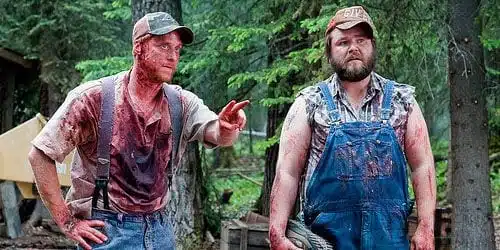
In the movies, hillbillies are shady characters with hearts of pure evil. Such accepted wisdom has become ingrained in horror lore, shaping classics (The Texas Chainsaw Massacre), forgettable schlock (Vacancy or Jeepers Creepers), and even art house drama (Winter’s Bone). The stereotype is used so casually and so frequently that it’s something of a surprise that it’s something of a surprise that no one has thought to parody it before now.
Tucker & Dale vs. Evil is a gleeful and punchy horror flick that draws on its predecessors — everything from Deliverance to The Hills Have Eyes to Fargo — and yet sports a brilliantly sharp and heretofore unexplored premise: its titular characters are actually naïve nice guys. Screenwriter and first-time director Eli Craig helms a film in which the scary and gory moments are better than most in the past year’s crop of horror films, and the humour is hilarious enough to resurrect the always uncertain horror-comedy subgenre. What’s more, at a brisk 90 minutes, its cultish ingenuity and obvious enthusiasm for that subgenre don’t overstay their welcome.
Deep in the Appalachian mountains — “hillbilly country,” as one of the characters notes — two goofball best buds, played by Tyler Labine and Alan Tudyk, are setting off to fix up their vacation home, blissfully unaware that the area was the site of a massacre some years ago. Upon arrival, they explain away the bones hanging from their roof as a sign the past resident “musta been an archaeologist or something.” Unfortunately, a group of college kids is camping in the same spot, and either instinctively or from years of movie indoctrination, they don’t take too kindly to hillbillies.
Wacky misunderstandings and miscommunications abound as the blood begins to spill; the film mines the bizarreness of its scenario, and the first half is blazingly inventive. The twist, of course, is that the story is always told from the perspective of the two assailed hillbillies who, wide-eyed and pretty socially awkward to begin with, have trouble explaining to the local sheriff why they are spattered with blood.
Labine is perfectly cast as Dale, who has a gruff but affable charm. But Tudyk steals the show (as he did in Death at a Funeral) with another wholly convincing performance. He pitches his lines with a Southern twang and a half-sigh, and it’s terrific fun to watch him run amok with a chainsaw, a half-homage and half-spoof of one of horror’s most recognisable images, a startling reinvigoration of the cliché. He’s chasing teenagers, of course, teenagers, who are usually the victims and, in the case of one lucky individual, the eventual hero/survivor of this kind of film. Here they come across as a group of spoilt and loud-mouthed brats. You wonder whether they are always this dislikable in horror movies, and you’re simply prevented from noticing to such an extent because most of the time, they’re the ones we’re meant to be rooting for.
This twist is one of many that make Tucker & Dale wittier than either the Scream series or Shaun of the Dead. The film knows that undercutting the elements that make up indelible, genre-defining moments — Leatherface and his lethal instrument, the rape scene in Deliverance, the wood-chipper from Fargo — is a silliness that is just waiting to burst out.
The first half of Tucker & Dale vs. Evil is terrific. But for all its innovation, it seems to run out of energy by the end: it has perhaps a few too many destined-to-die teenagers, and resolves this by suddenly killing them off quickly and bloodily. The final act turns into rote slasher material, with a psycho killer on the rampage and the uneasy hero having to find the inner strength to continue. There is the possibility, maybe, that the film is parodying yet another familiar horror movie cliché — starting strong and then dropping off — but I doubt it. The climax, too, is placidly predictable, although the faux soap operatic revelation that a key character is “half hillbilly” manages to raise a laugh.
All that said, this adroit genre hybrid avoids the snide postmodern winks and self-conscious cleverness that has plagued horror-comedy combinations of late. Audiences will appreciate the respectful references, the originality of its setup, and its endearing lead performances. If only every homespun spoof were as hard-hitting and genuinely funny as this one.

